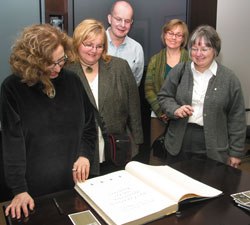‘Digital dark ages’ haunt archivists

Nancy Marrelli and the archivists in the University Archives, Nathalie Hodgson and Vincent Ouellette, plus Céline Fortin (Office of the Provost) and Estelle Bouthillier (President’s Office).
marion elissalde
Archives, the sum of the documents created in the routine course of activities, are sources of memory, information and action. They play an essential role in the development of society. Archives are a unique, precious and irreplaceable heritage transmitted from generation to generation.
That’s the opening of a declaration made by the roughly 600 archivists of Quebec. They want you to sign it to acknowledge that what they do, and what we help them do, is important.
University Archivist Nancy Marrelli helped put the declaration together. “We’re very discreet,” she said with a smile. “As an archivist community, we felt we’re quietly competent, but it was time to wave our flag.”
Archives keeps the university’s historical material going way back to the 19th-century origins of Sir George Williams University and Loyola College, and stores Concordia’s official documents.
The employees work in quarters on the tenth floor of the Hall Building. There are only four of them — three archivists and a technician — so, like reference librarians, they train university employees to use their facilities rather than doing it for them. Marrelli tries to reduce their anxiety by assuring them that they can’t save everything.
“The rule of thumb for universities is that for archival purposes, we keep about five per cent of the materials we create, and although you approach it as rationally as possible, it can sometimes be a bit hit and miss. You’re bound to make mistakes, and miss something.”
She’s more worried about our complacency, especially about electronic records. Archivists have coined the phrase “digital dark ages” to describe our era of so much digital documentation, much of which will not survive.
“We’ve already lost some of these important historical materials that seemed like they would be with us forever,” she said. “People think that because digital is easy, cheap and convenient, it will be permanent. When you build a financial record digitally, for example, how do you know it won’t be altered? And will it be accessible in 100 years?
“What will replace compact discs? Something will, you can be sure of that. Will you do all the migration to the new formats to ensure access? Are you migrating in a way that will ensure authenticity? We don’t know how long digital printouts will last, either.”
Not that Archives isn’t keeping up with the times: The longstanding need for staff to do digital records management is finally being addressed with two new positions.
Transferring tangible materials to a disc may be convenient for storage, Marrelli said, but there’s nothing like actually seeing and touching Voltaire’s will or Victor Hugo’s manuscript for Les Miserables, as she has, to feel the thrill of conservation.
University Archives has a number of special collections and fonds (holdings not formally organized) of which it can be proud. These are all connected to Montreal or the university itself, including the heyday of jazz in Montreal, the development of visual arts groups in the city, and material related to Montreal’s Irish community.
University faculty and students alike use Archives as an academic resource. The Department of Art History provides graduate student research assistants, a symbiotic relationship that benefits both the Archives and the students.